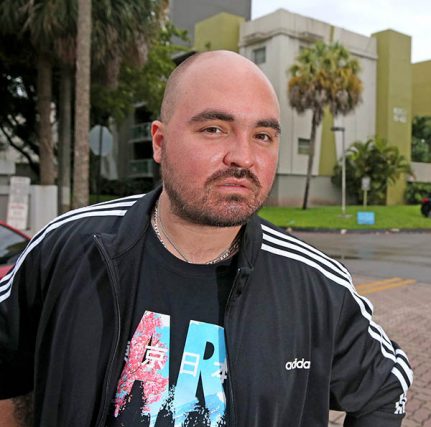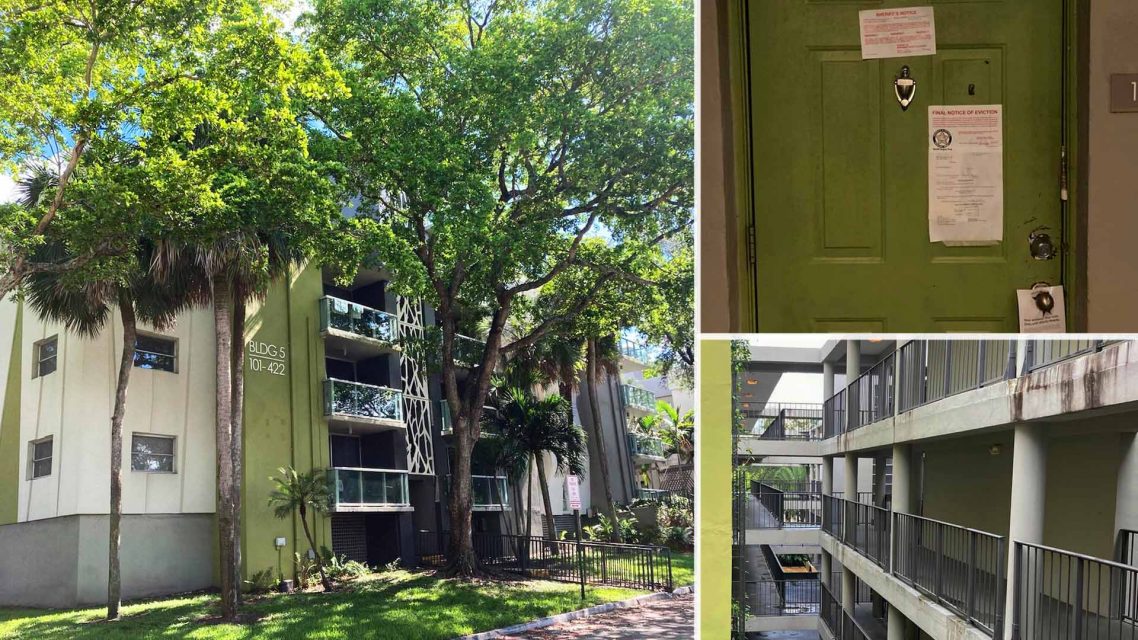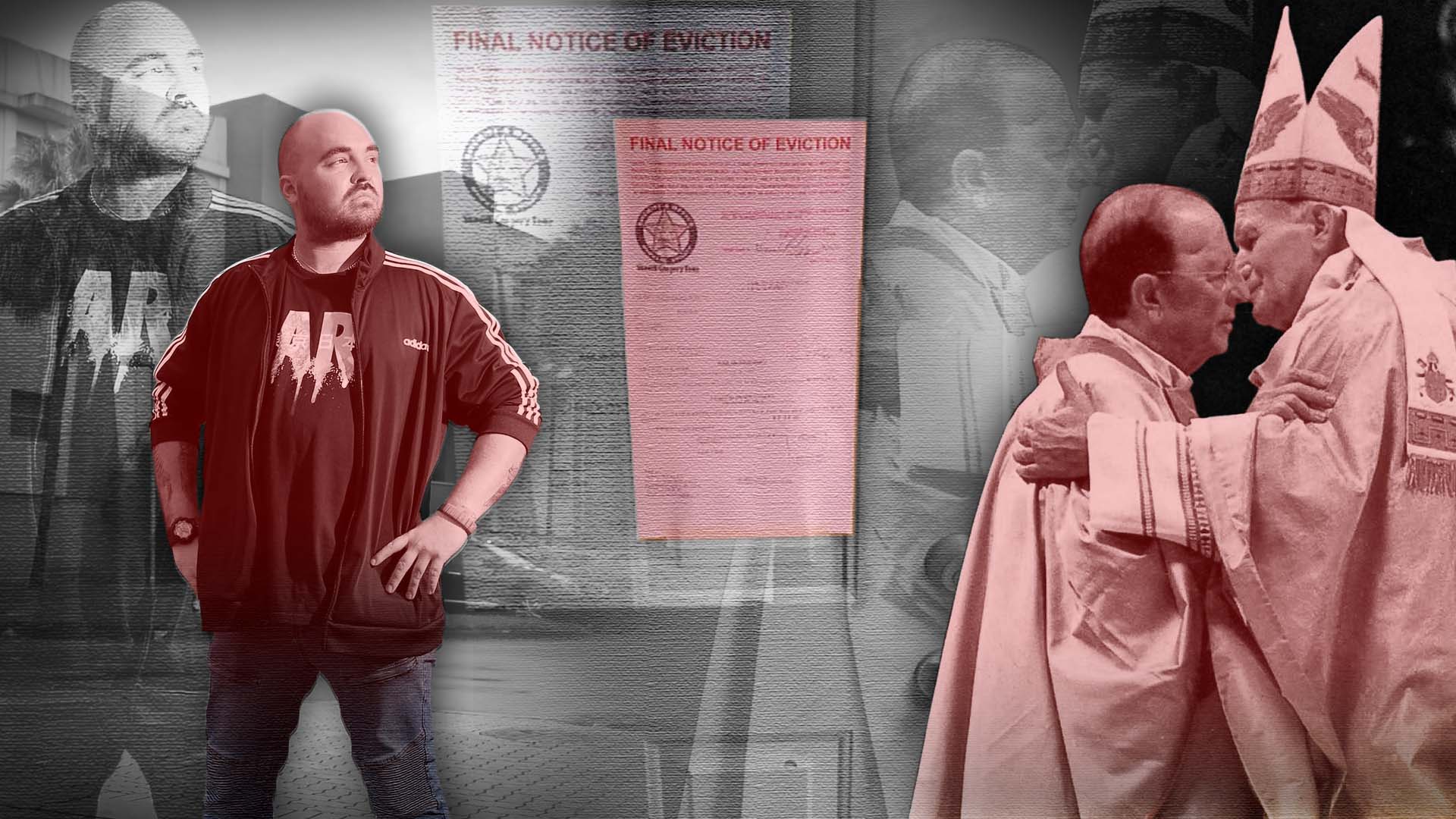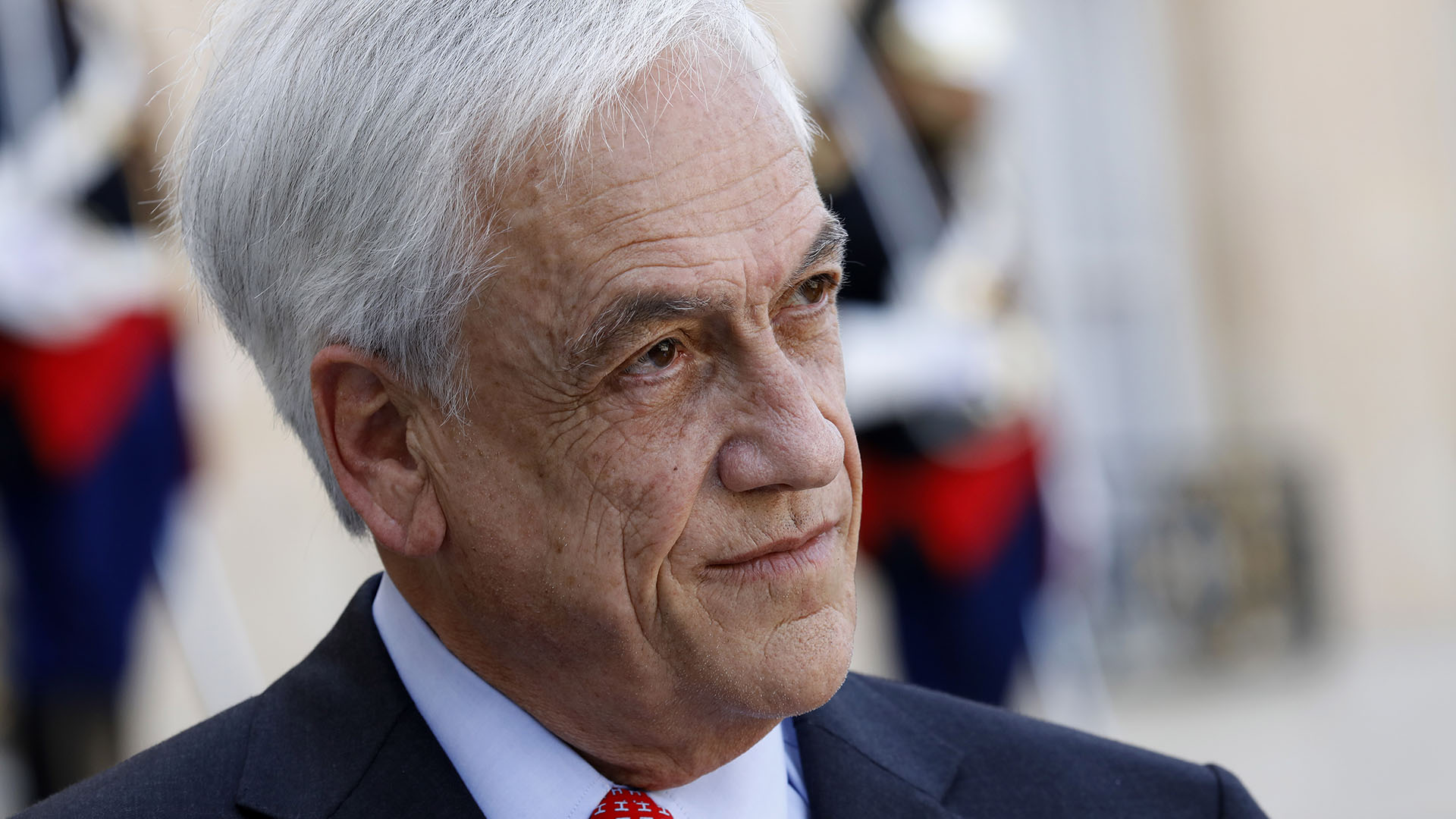In January, Carlos Lomena, a truck driver in suburban Miami who lost his job during the coronavirus pandemic, begged a judge to stop his landlord from evicting him.
The 37-year-old Lomena hoped to get a fair shake in court. He’d emigrated from Venezuela after high school with a sense that the U.S. had a more just legal system.
In a letter to the Florida judge, he pointed to a recent extension of the nationwide moratorium on evictions during the coronavirus outbreak and asked for more time to pay his overdue rent.
“I do not have a place to go,” Lomena wrote, “nor the money to move into a new apartment.”

His landlord — a holding company formed by real estate firms in Miami and Iowa — wasn’t moved by his pleas; it had investors to satisfy. The company pressed the court to evict him and, in early February, the judge ruled that Lomena hadn’t filed the right form to prevent his eviction. Within days, during the height of the pandemic, the Broward County Sheriff’s Office posted a large notice in bold red letters on his door ordering Lomena to vacate his home within 24 hours or be arrested for trespassing.
Lomena isn’t alone.
Tenants across the country have faced aggressive tactics — including evictions during the pandemic — from a growing number of massive corporate landlords that draw on pools of money from wealthy investors around the world.
A trove of leaked documents reviewed by the International Consortium of Investigative Journalists and 150 media partners provide an unprecedented view of global financial maneuvers that turn rent payments into big profits that are often hidden in accounts owned by shell companies controlled by anonymous investors.
The investors revealed in the leaked documents include offshore trusts holding hundreds of millions of dollars for the Legion of Christ, a wealthy Roman Catholic order disgraced by an international pedophilia scandal.
The confidential records show that the trusts became a secret partner in the ownership structure of Lomena’s apartment complex, working with the landlord to invest $2 million in the complex in 2015. The trusts invested millions more in other modest residential buildings in Florida, Texas, Iowa, Indiana and Illinois.
Soon after the Vatican announced in 2010 that it would seize the operations of the troubled order and launch a new investigation, high-profile Legion of Christ operatives began quietly setting up one of a trio of New Zealand trusts designed to hold money for the Legion, according to leaked records.
Two of these trusts, formed shortly after, secretly moved millions of dollars around the world. This included more than $14 million funneled into investments in apartment complexes that Pensam Capital, the firm that owned Lomena’s building, was acquiring across the United States. In comments to ICIJ, Pensam said it has not received information indicating it has received investments from the Legion.
These two trusts would come to hold nearly $300 million in assets devoted to the Legion of Christ, according to leaked records, at a time when victims of sexual abuse by its priests were seeking financial compensation from the order through lawsuits and through a commission overseen by the Vatican.
In response to questions about whether the Legion disclosed the trusts to the Vatican, the order told ICIJ that “religious institutes do not have an obligation to send detailed information to the Vatican regarding their internal financial decisions or organization.”
In statements to ICIJ, the Legion acknowledged it had set up one of the three trusts, but distanced itself from the other two, which held the majority of the funds designated for the Legion. The Legion said it had no knowledge of the other two trusts’ operations. The two trusts were funded by scions of a prominent industrialist family in Mexico, including Father Luis Garza Medina, one of the Legion’s top leaders. A spokesperson responding to ICIJ’s questions for Father Garza said that Garza has no control over the trusts.
A review of leaked documents by ICIJ shows deep connections to the Legion in all three trusts, which share the same New Zealand address and have the same trustees managing them.
The spokesperson for Garza said the secret trusts were strictly charitable and devoted to the support of elderly priests and other Catholic causes, and that the trusts have only made charitable distributions.
The leaked documents are part of the Pandora Papers, the millions of secret files at the heart of a global investigation by ICIJ and its media partners, including the BBC, the Washington Post, L’Espresso in Italy, El Pais in Spain and the Mexican publications Quinto Elemento Lab and Proceso. The records involving the Legion of Christ come from Asiaciti Trust, a Singapore-based corporate services provider that helped administer the New Zealand trusts.
The trove contains large amounts of data on various wealthy investors who used offshore entities to channel money into real estate.
They are part of a growing class of international investors in real estate ventures that often use hardball tactics to maximize the rate of return from properties occupied by low- and mid-income renters.
Dozens of current and former tenants at Pensam-owned buildings interviewed for this article described problems with their units, including flooding, mold or mildew, broken appliances and dangerous elevators. Pensam routinely partners with Iowa-based BH Management Services, which takes on the day-to-day administration of its buildings.
A review of more than 100 court cases in Florida showed that the property managers added steep penalties on late rental payments and pursued rapid evictions of tenants unable to pay their rent. Tenants said customer service was difficult to reach and eviction notices appeared to be a go-to tool to manage tenants. In a statement, BH Management said it coordinates rent collection “under strict adherence of lease agreements and the law, including the CDC order on evictions.”
The kids asked: ‘How are we going to tell people we live in a hotel?’ The whole thing is devastating for a family. — Collette Northrop
The high returns that financial firms promise their wealthy investors inevitably lead to vulnerable renters being squeezed, according to Jim Baker, the executive director of the Private Equity Stakeholder Project, a nonprofit organization that monitors private equity firms and other large investors.
“This is the problem of growing global wealth inequality crystallized in one industry,” Baker said.
In 2013, Pensam and BH Management evicted Collette Northrop and her children from a Dunedin, Florida, apartment after the family missed an $895 payment, according to court records. Just months before, the trusts holding money for the Legion of Christ had secretly invested at least $1 million toward Pensam’s purchase of the apartment complex. Northrop said that the family moved into a motel and that her children switched to a new middle school. “We were homeless at that point,” Northrop said. “The kids asked: ‘How are we going to tell people we live in a hotel?’ The whole thing is devastating for a family.”
‘The millionaires of Christ’
In 1941, a charismatic Mexican priest named Marcial Maciel founded the Legion of Christ, a Catholic order that would become known for its intense focus on courting wealthy patrons. Some would come to call Maciel’s order “los millonarios de Cristo” — “the millionaires of Christ.”
Over six decades, a cult of personality grew up around the group’s founder. Members of the Legion were taught that Maciel was a “living saint.” His creation grew and became a global force as it cultivated ties to Vatican officials, very wealthy Catholics and conservative Republican luminaries in the U.S. such as Domino’s Pizza founder Tom Monaghan, former Florida Gov. Jeb Bush and former Sen. Rick Santorum of Pennsylvania.

Maciel became “the greatest fund-raiser of the modern church” — and “its greatest criminal,” according to Jason Berry, an investigative reporter who delved deeply into the Legion and its leader.
In early 1997, Berry and a reporter at the Hartford Courant wrote a front-page story that exposed Maciel’s decades of sexual predation, reporting that nine men had come forward to accuse him of sexually abusing them when they were boys or young men training to be priests.
Before the story was published, Berry later reported, one of Maciel’s confidants, the Rev. Luis Garza, “traveled to Legion houses in several countries to warn of the forthcoming article, claiming it would be based on lies and telling Legionaries … not to read the report should they see a copy.”
In 2006, after being plagued for years by accusations against the Legion’s founder, the Vatican investigated nearly 100 abuse allegations against Maciel and removed him from ministry with an order that he adopt a “life of prayer and penitence.”
When Macial died in 2008, the scandal didn’t die with him. Revelations that he’d fathered several children with different women brought more negative attention to the Legion of Christ. The Legion was increasingly viewed as a liability to the Vatican.
Amid the continuing scrutiny, much of the order’s leadership passed to Garza, known as an architect of its complex finances. Garza came from the family that has controlled Mexico’s Alfa conglomerate for decades. Garza joined the Legion after graduating from Stanford University, and he quickly rose through the ranks to become one of Maciel’s most trusted lieutenants.
On May 1, 2010, the Vatican announced that it would seize control of the Legion’s operations, the church’s most dramatic action against a Catholic order during the global abuse scandal. The Vatican would examine the Legion’s finances and possible sex crimes and establish a commission to compensate its victims.
The following month, one of Maciel’s sons filed a high-profile lawsuit against the Legion, alleging that the order had knowingly allowed Maciel to abuse him and other children.
In July 2010 — two days before the Vatican-appointed official took the reins of reforming the Legion — Luis Garza quietly helped to establish the first of the three secretive trusts in New Zealand that would hold money for the Legion.
The Vatican did not directly respond to questions about the trusts, but said that its effort to reform the Legion was mostly focused on issues around its founder and its structure.
During its investigation, the Vatican appeared to be operating on the belief that the Legion was low on money. The Vatican overseer of the Legion, Cardinal Valasio De Paolis, wrote in September 2011 that the Legion’s financial situation was “serious and challenging” and that some victims were asking for “enormous sums that the Legion absolutely cannot afford,” according to a 2014 book by Italian journalist Gianluigi Nuzzi based on leaked Vatican sex abuse records.
At the time the trusts were established, New Zealand was a popular destination for people seeking to hide money offshore using trusts. The trusts holding money for the Legion maintained four Swiss bank accounts, including one at a Geneva-based bank, Lombard Odier, that the U.S. Justice Department later found had helped American clients conceal assets from U.S. tax authorities.
Garza’s sister, Roberta Garza, who left the Legion’s lay branch after high school, told ICIJ that historically the Legion used offshore structures to divert religious and charitable money to more self-serving purposes, including Maciel’s lavish lifestyle, his secret children and his drug habits. “A lot of their money was held outside the Legion by their financiers, by people with power of attorney who are completely faithful to the Legion,” Roberta Garza said. “So you’re never going to find it.”
“We are not aware on what bases Roberta Garza makes her affirmations,” Father Aaron Smith, a spokesperson for the Legion said in response. “We have found no proof of use of offshore structures to divert religious and charitable money from the Congregation to finance what we know about Maciel’́s double life.”
As the New Zealand trusts quietly built their investment portfolios, the Legion faced legal threats on multiple fronts.
In civil litigation that began in 2011, Luis Garza and other Legion members were accused of defrauding an elderly Catholic woman out of $60 million in charitable donations to the order. According to The Associated Press, Garza was one of the Legion leaders responsible for distributing money from the woman’s trusts, although he was not a defendant in the case. The Legion at the time said that it did not unduly influence the widow. The case was later dismissed by a Rhode Island judge who said the woman’s niece did not have standing to sue.
Police in Milan opened a criminal investigation in 2013 into whether senior Legion clergymen offered a bribe to induce an Italian sexual abuse victim to recant testimony he had given prosecutors. Four Legion members were charged with attempted extortion and obstruction of justice. The case is pending.
Garza was himself accused of child molestation in a 2016 suit that attracted media attention, but it was withdrawn in 2019. At the time, a spokesperson for the Legion said Garza “categorically denies his involvement in this or any other abuse.” The Legion’s own internal investigation cleared Garza. In May, lawyers for the alleged victim told L’Espresso, an ICIJ partner in Italy, that they are exploring ways to refile the suit.
In November 2017, L’Espresso published an investigation into a portion of the Legion’s offshore finances, revealing that $300 million had moved through a Legion-owned company in Bermuda more than a decade before. Although the New Zealand trusts were active when this information became public, they remained a well-kept secret. Responding in 2017 to disclosures of its financial activities in Bermuda and other tax havens, the Legion declared that it “does not own offshore companies, nor does it own resources in offshore companies.”
The order characterized the offshore accounts as a relic of Maciel’s bygone reign.
In February 2020, Pope Francis told the Legion that the order had been tainted by the cult of personality surrounding its founder, and, even after a decade of heightened supervision from the Vatican, the order was still not fully reformed.
‘Spiritual projects’
Pensam Capital is part of a wave of new investment firms that have plowed billions of dollars into the global real estate market in the wake of the 2008 financial crisis — a trend that has raised fears of a financial industry takeover of housing.
In 2017, a United Nations-backed research paper warned that the “expanding role and unprecedented dominance of financial markets and corporations in the housing sector” were contributing to increases in poverty, evictions and homelessness around the world.
On its website, Pensam Capital boasts of investing more than $3.5 billion in rental properties since 2009, and advertises, among its services, “direct investments” in real estate.
Although Pensam focuses on apartment rentals, other investment firms, including some private equity investors, dramatically increased purchases of single-family houses after 2008. Among these firms are some of the largest and best-known, such as Blackstone and Colony Capital. Blackstone has bought more than 80,000 single-family homes across the country over the past decade.
One of the biggest players in single-family homes is Pretium Partners, a private equity firm that quickly rose to prominence in the field after its founding in 2012, and shot past many of its rivals to become one of the largest owners of single-family homes in America. Often known as Progress Residential, the firm owns more than 55,000 houses across the country.
The Pandora Papers include records revealing the complex offshore workings of Pretium’s original investment fund. A U.S. House committee is investigating the many evictions of Pretium tenants during the pandemic. In response to questions from ICIJ, Pretium said that it “always complied with the CDC moratorium” and that “no resident covered by a CDC declaration has ever been evicted from Pretium’s homes for non-payment of rent.”
While Pensam Capital has kept a lower profile than Pretium, both companies attracted investors who used offshore financial arrangements.
As scandal swirled around the Legion of Christ, assets from two of the New Zealand trusts were being shuttled around the world and into various U.S. rental properties.
Through Pensam Capital, the trusts invested in at least eight apartment complexes in Florida, Texas, Indiana, Illinois and Iowa. In leaked documents obtained by ICIJ, Pensam pegged its target rate of return at about 15% annually from its rental properties, a yield that would comfortably outpace normal stock market returns.
The trusts made dozens of other investments, including stakes in a chain of rehab facilities, a Texas-based medical device company and a Mexican nutritional supplements company.
The structure the trusts used to make investments appears designed both for secrecy and to allow the Legion to legally distance itself from the vast stores of money.
“Trusts allow you to enjoy things when it’s the right time but not have the downsides of technically owning the money,” Andres Knobel, a researcher at the Tax Justice Network who has studied trusts extensively, told ICIJ. “On paper, they can say: ‘I have nothing to do with this.’”
The New Zealand trusts were not required to make public filings that would link them to Legion leaders.
Leaked Asiaciti documents from 2004 to 2017 describe New Zealand as “providing advantages of an established offshore jurisdiction” without the stigma of a well-known tax haven. The documents claim that the New Zealand trusts do not have to be registered with any government entity in New Zealand and that they are ideal for those seeking to protect their assets from creditors and tax collectors. (In 2017, after ICIJ reporting partners revealed New Zealand as a popular destination for wealthy people to hide their assets, the country strengthened its regulation of trusts.)
To carry out investments in the U.S. the New Zealand trusts used a Delaware shell company called Lowndes Holdings Inc. Lowndes’ public filings contain no trace of its relationship to the trusts or the Legion.
The Legion and its leaders were under no sanctions and were involved in no criminal proceedings in the U.S. But the investments still suggest how easy it is to plow millions of dollars into U.S. real estate while keeping a low profile. Experts blame lax federal regulation for permitting secrecy that makes U.S. real estate investment appealing for those seeking to hide money.
Pensam said in a statement that it “adheres to a comprehensive ‘know your customer’ compliance program when analyzing whether to accept a new investor or continue a relationship with an existing investor.” It said that it “did not, and has not, received any information that would lead Pensam to believe that any of its investors have been or are currently governed or managed by the Legion of Christ.”
In comments to ICIJ, the Legion acknowledged that it had created one of the three trusts — the Retirement and Medical Charitable Trust — in order to receive donations that would fund the lives of elderly priests. The Legion said it had no knowledge of the operations or the terms of the two trusts holding most of the money — the AlfaOmega Trust and Salus Trust. These two trusts hold hundreds of millions in assets devoted to the Retirement and Medical Charitable Trust. The two trusts were separately funded by Garza and two of his siblings, and a spokesperson said the Garzas have no control over the trusts.
A Legion spokesperson said it would be wrong to “attribute any decisions, investments, or activities” of the two trusts to the Legion. But the spokesperson acknowledged that the Legion sometimes requested “donations” from the two trusts, “which are free to grant or deny these requests.”
Yet a review of numerous leaked records shows that all three trusts are extensively linked to the highest levels of the Legion.
Prominent Legion officials help to govern all three trusts. The three trusts have the same addresses, the same trustees, are administered by the same trust company, and have accounts at the same Swiss banks. A Legion financial operative named Alejandro Páez Aragón is the AlfaOmega and Salus trusts’ “protector” — a position giving him extensive influence over the trusts. Around the time the trusts were established, Páez Aragón was the director of the Legion’s foremost private investment vehicle, Grupo Integer. Páez Aragón also is Luis Garza’s brother-in-law.
In a leaked 2016 memo, a New Zealand tax lawyer analyzing the three trusts called the AlfaOmega and Salus trusts “essentially conduits to the” Retirement and Medical Charitable Trust.
The trusts’ managers hoped they would qualify as purely “charitable or religious” for the purposes of gaining benefits of New Zealand’s tax treaty with the U.S. But the lawyer’s memo warned that the AlfaOmega and Salus trusts had “no express prohibition on the appointment of non-charitable beneficiaries.”
The lawyer recommended restricting the trusts to strictly charitable purposes by removing the possibility of specific individuals becoming beneficiaries. It is unclear whether this change was ever made.
In statements to ICIJ, a spokesperson for the AlfaOmega and Salus trusts said that the trusts were intended to “help elderly priests and consecrated individuals as well as supporting social, charitable, and spiritual projects based on Catholic teachings.” The charitable giving for elderly members includes “providing funding for living expenses such as accommodation, food, and medical needs,” the spokesperson said, adding that the trusts had opened Swiss bank accounts because “the financial industry in that country is well advanced, and allows for open investment architecture, where banks have access to many financial products, and have the competence to understand and recommend them.”
A spokesperson for the trusts said that the trusts were formed in New Zealand because the country is “professional, reliable, cooperative and serious,” and said that the trusts remained there after the new regulations to “take advantage of the country’s stricter legal and transparency laws rather than move to a country with less stringent laws.”
The spokesperson said the trusts can change their intended recipients at any time.
In an undated filing to the U.S. Internal Revenue Service obtained by ICIJ, the Retirement and Medical Charitable Trust claims a tax exemption as a purely charitable or religious organization.
A spokesperson responding to questions for Garza said that “the trusts have provided an average of $1.0 million annually to provide food, housing and healthcare to a large number of retired and aging priests, nuns, and consecrated individuals.”
‘Living in a nightmare’
In early September 2015, the New Zealand trusts used Lowndes Holdings to invest $2 million in the complex where Carlos Lomena would live in Plantation, Florida. According to its website, Pensam would add value to its investment by upgrading the apartments’ exteriors, changing the landscaping and making other improvements. Pensam told ICIJ that it invested millions in renovations to the complex.
The complex was legally owned by a holding company called PBH Plantation LLC — an apparent nod to the partnership between Pensam Capital and BH Management.
ICIJ visited the buildings in late June, just after Pensam reportedly sold the complex for $46 million to a Miami-based property management company.
The facades of the four-story buildings are attractive, with modern glass handrails on apartment balconies and earthy colors that go well with the tropical landscaping. Beyond the facades, outdoor walkways show signs of water damage and mildew covers apartment doors. A large eviction notice lingered on the door of a former resident who had been expelled in May.

Tenants who rented from PBH Plantation said management was quick to hit them with painful late fees.
“If you’re three days past rent day, you get a $100 late fee. If you’re three days past that, you get a letter talking about eviction,” said a former PBH Plantation renter, who left the apartment complex because of a rent increase and who asked to remain anonymous.
Earl Walker, a renter in the Plantation complex, said PBH Plantation took months to address water damage and leaks in his unit — but was quick to punish him when he paid rent slightly past the three-day grace period. “I had a leak here, and they took months to come and fix this. But I’m late by a couple hours, and they’re sticking to their guns this way,” Walker said of the late fee. “That’s not really fair.”
Mariya Vazhelyuk, a mother of two, said that her third-floor apartment has had extensive leaking during rainstorms and that her children developed breathing problems during their first months there — a reaction, she believes, to mold or mildew. She said that several months before Pensam sold the building, an elevator door closed on a stroller with one of her children in it. The child was unharmed, she said, but the stroller was pinned between the doors.
According to public records, Broward County inspectors found 40 violations involving the complex’s three elevators between February 2018 and April 2021, including expired permits, broken mechanisms to keep elevator doors from opening between floors, broken emergency phones and alarms, and expired fire extinguishers.
In August 2019, the city of Plantation issued a citation for “excessive mildew” on the stairs and walkways throughout the complex, as well as an “odor nuisance” from garbage.
Several former tenants at Pensam-owned buildings complained about court costs and other fees attached to eviction proceedings.
A 2017 eviction filing from one of Pensam’s Florida apartment complexes, for example, showed the firm’s property manager charged a renter, who owed $1,960 in back rent, an additional $662 in attorneys’ fees and court costs, $203 in late fees and about $175 in “other charges” — bringing the total to $3,000.02. This building was also overseen by BH Management.
“These companies see late fees and court fees as an important way to increase their revenue,” Shamus Roller, executive director of the National Housing Law Project, told ICIJ. “This process is meant to extract the most money from the poorest tenants.”
What bothers Lomena most about his ordeal was PBH Plantation’s unwillingness to work with him, even during the pandemic eviction moratorium. In his January letter to the judge, Lomena noted that he had just started a new job, although he had not yet received his first paycheck.
The eviction proceedings dragged on for weeks, during which Lomena sold nearly all of his furniture on Facebook Marketplace — so that he’d be able to leave on short notice if he lost his case. “I sold everything,” Lomena said. “Being there was like living in a nightmare.”
A spokesperson for BH Management Services said it is “responsible for coordinating rent collection from tenants, which we do under strict adherence of lease agreements and the law, including the CDC order on evictions during the COVID-19 pandemic.”
Lomena had called lawyers for help, he said, but none offered a rate he could afford. So he attempted to fight the case himself. Because he had not filed the necessary federal Centers for Disease Control and Prevention form for eviction protection — he had only invoked the CDC moratorium in his letter to the court — the judge approved the eviction on Feb. 4.
In a statement to ICIJ, Pensam said that BH Management was “committed to not removing any resident for the non-payment of rent when a valid CDC declaration was submitted.” Pensam said that “late fees and legal fees are stated in every lease agreement” and “are consistent with industry standards, and comply with federal, state, and local laws.”
A week after the judge’s ruling, Lomena came home to two eviction notices from the sheriff’s office on his front door. Lomena hustled to find a place to live, and rented a room for $700 a month in the house of an elderly woman.
Lomena said his new landlord allows him to use the kitchen only on Sundays, when he cooks food for the rest of the week. He said he struck a deal with PBH Plantation to pay off his debt — a mix of rent, late fees, attorneys’ fees and other charges — in installments of about $300 a month.
Lomena said he hopes to move into his own apartment again but is concerned that no landlord will take him because of his eviction — a major long-term consequence of eviction, according to housing advocates.
“I don’t feel like I can keep afloat here,” Lomena said. “I want to move forward, save some money, and be happy.”
Contributors: Mathieu Tourliere, Andrea Cardenas, Georgina Zerega, Leo Sisti, Mike Hudson, Dean Starkman, Kathryn Kranhold, Margot Gibbs, Brenda Medina, Agustin Armendariz, Emilia Diaz-Struck.








